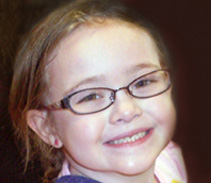
Rylee’s story began on January 8, 2009, at the emergency department at American Family Children’s Hospital (AFCH). She was brought there with bloody diarrhea and dehydration, which was found to be caused by two types of foodborne bacteria: Shigella and E. coli.
Three days later, Rylee developed hemolytic uremic syndrome (HUS, a disease that can occur in children with these types of bacterial infections). It caused Rylee’s kidneys to shut down.
Typically, HUS-related renal failure resolves by itself, explained pediatric nephrologist Sharon Bartosh, MD. “Most children need medical support and short-term dialysis while the disease runs its course,” she said. “They usually recover on their own with few, if any, residual medical problems.”
“But Rylee was the exception to the rule.”
Life-Threatening Complications

Rylee spent the next week in the pediatric intensive care unit (PICU) receiving support and dialysis. But on January 19th, her condition worsened so dramatically—she even went blind in her left eye—that the pediatric critical care team, under the direction of Tom Brazelton, MD, MPH, needed to intubate her and induce a medical coma.
Pediatric surgeon Dennis Lund, MD, then performed exploratory abdominal surgery, and found that the disease had destroyed half of her large intestine. He removed six feet of Rylee’s bowel and performed colostomy surgery.
Rylee then spent the next six weeks asleep in the PICU. By the end of February, she was getting better enough to wake up, though it took a few more weeks before she could breathe on her own or eat solid food. She also had to be carefully weaned from the drugs used for the medical coma.
Slowly, she was recovering, but the disease had caused one more complication: irreversible disease-induced diabetes.
Returning Home
Rylee, now four years old, finally returned home on April 30, 2009, with insulin-dependent diabetes, a colostomy, and renal failure.
Despite this, her father, Johnathan Williams, described the next several months at home as “uneventful.” A new insulin pump to replace the frequent needle shots, and surgery to restore her intestinal function, improved Rylee’s quality of life.
But Rylee’s family, who had since moved to Middleton to be closer to AFCH, was still bringing her in for dialysis three times a week. Although many children with renal failure can receive peritoneal dialysis at home, for Rylee, given all of the other health considerations she had, hemodialysis at the hospital was felt to be her best option.
“She inaugurated our new pediatric hemodialysis unit,” Dr. Bartosh said. “We built this unit specifically so children needing in-center dialysis could come to a convenient and familiar place at the AFCH.”
The Biggest Gifts of All
Finally, on October 23, 2009, Rylee underwent a successful kidney transplant, ending her need for dialysis once and for all. Her father was the donor.
What’s more, Rylee is on a prednisone-free immunosuppression regimen—part of an innovative protocol that Dr. Bartosh began studying and offering to children over six years ago.
Nationwide, 70 to 80 percent of pediatric transplant patients take prednisone, along with other drugs, to prevent organ rejection. But prednisone comes with many undesirable side effects, including decreased growth, weight gain, and high blood sugar.
For years, transplant researchers have been looking for ways to prevent organ rejection without using prednisone. “Most efforts to avoid using prednisone are happening with adult transplant patients,” Dr. Bartosh explained. “We were one of the first pediatric programs in the country to offer this type of novel immunosuppression for children undergoing a kidney transplant.”
Looking Back, and Looking Forward
Reflecting on the year, Rylee’s father said, “The PICU was amazing. Dr. Bartosh and Dr. Brazelton were the two doctors we saw the most, and they always gave it to us straight.”
That forthrightness—especially in regard to Rylee’s diabetes—helped him understand the disease and feel comfortable talking to doctors about it. “[Knowing she might be diabetic] was for the best, though at the time it was the worst thing we could have heard.”
Now, Rylee and her family are back home in Sun Prairie, getting ready for her to start kindergarten in the fall.
“She doesn’t have many restrictions,” her father said. “She runs, rides a bike, acts like a normal child. The only difference is that she has an insulin pump.”
And as for Rylee, “she knows everything that happened to her,” he said. “If she meets a new child, she tells them that last year she had E. coli, and that they shouldn’t eat fast food because they might get it.”